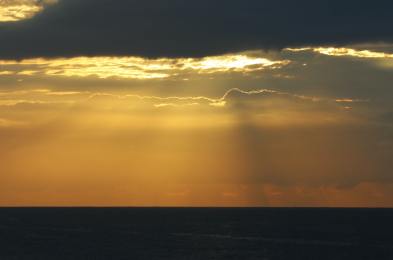
It has long been known that charged particles, such as electrons and protons, produce the electromagnetic equivalent of a sonic boom when their speeds exceed that of photons in the surrounding medium. This effect, known as Cherenkov emission, is responsible for the characteristic blue glow from water in a nuclear reactor, and is used to detect particles at the CERN Large Hadron Collider.
According to Einstein, nothing can travel faster than light in vacuum. Because of this, it is usually assumed that the Cherenkov emission cannot occur in vacuum. But according to quantum theory, the vacuum itself is packed full of “virtual particles,” which move momentarily in and out of existence.
These ghostly particles are usually not observable but, in the presence of extremely strong electric and magnetic fields, they can turn the vacuum into an optical medium where the speed of light is slowed down so that high velocity charged particles can emit Cherenkov gamma rays. This is totally unexpected in a vacuum.
A group of Physics researchers at Strathclyde have found that in extreme conditions, such as found at the focus of the world’s most powerful lasers, and the huge magnetic fields around neutron stars, this ‘polarised’ vacuum can slow down gamma rays just enough for Cherenkov emission to occur. (1)
In the cosmos of phenomena, even nothing is not real.
And in the void of existence, something will always be.
In a universe ruled by light, things still travel faster than it.
Defying the rules. For the only rule is that there are no rules.
In a cosmos of being, everything can and will exist.
Only to show that being is defining the definitions.
Watch that particle travel faster than light.
It is not traveling at all, you know.
You are…
Ask it and it will tell you. It is standing still.
Watching you traveling faster than light…
And yet, it makes the same mistake as you did.
It never asked you whether you feel running…

